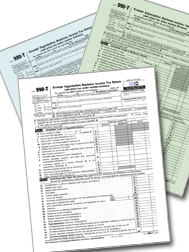By Dave Moja
Churches are automatically considered tax-exempt organizations by the Internal Revenue Code, and also exempted from the requirement to file the annual Form 990 (Return of Organization Exempt From Income Tax). But while churches are tax-exempt organizations by law, local congregations are still affected by many tax issues. These include unrelated business income tax (UBIT), the correct classification of independent contractors, ministerial compensation and other common tax concerns.
Unrelated business income tax
 Although churches are exempted from filing Form 990 annually, they may be required to file Form 990-T (Exempt Organization Business Income Tax Return) if their activities generate gross unrelated business income of more than $1,000. “Gross income” is defined as “gross receipts minus cost of goods sold.”
Although churches are exempted from filing Form 990 annually, they may be required to file Form 990-T (Exempt Organization Business Income Tax Return) if their activities generate gross unrelated business income of more than $1,000. “Gross income” is defined as “gross receipts minus cost of goods sold.”
Churches may generate unrelated business income from a parking lot, cell phone tower and office rentals, bookstores, rental of equipment in conjunction with events, and advertising in event programs or sports venues. In many cases these activities are specifically excluded because they are conducted for the convenience of members, meet the “corporate sponsorship” exclusion, or are substantially staffed by volunteers. The governing principle for UBIT is that it’s not how the funds are spent, but how they are generated. Just because a church uses the “profits” from an unrelated business activity to fund its exempt purpose activities does not mean that those “profits” will not be subject to UBIT.
Employee classification
Recently, the IRS has been conducting a “compliance project” on employment tax issues.
One of the focuses of this compliance project has been whether organizations are correctly classifying workers. The delineation between employee and independent contractor is important to the IRS. Form SS-8 (Determination of Worker Status for Purposes of Federal Employment Taxes and Income Tax Withholding) provides a good framework for helping churches discern the proper classification. I would caution against filing Form SS-8 without conferring with your tax advisor, but the form and its instructions can provide good guidance in this area.
If a church finds that it has improperly classified employees as outside contractors, there are several remedies. The IRS is currently conducting a “voluntary classification settlement program” where organizations may seek to reclassify misclassified workers. The program may dramatically reduce penalties that would normally be imposed in a reclassification of this nature.
The application is made on Form 8952, and you should seek the advice of your tax advisor before proceeding. In many cases, the “Section 530” relief described in IRS Publication 1976 may be a better option than the voluntary program.
Ministerial housing allowance
A minister may generally exclude a designated housing allowance from income. The allowance must be the lesser of:
- Amount approved in advance by the church,
- Actual expenses incurred, or
- Fair rental value of the house.
Finally, although churches are currently exempt from filing Form 990, this may not continue to be the case for all churches. There’s much discussion in Washington about which types of organizations may have to file in the future. Church financial leaders, especially those at larger churches, should familiarize themselves with Form 990 – just in case.
Dave Moja is a partner with CapinCrouse LLP, in Melbourne, FL, and national director of not-for-profit tax services. www.capincrouse.com


